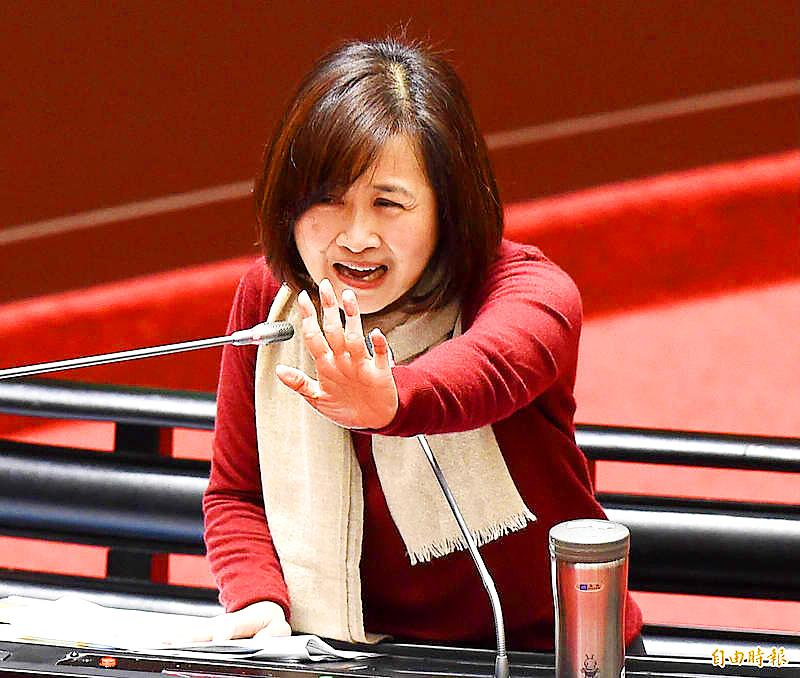The Ministry of Education should hold discussions and prepare for a possible reopening of schools in September, Chinese Nationalist Party (KMT) Legislator Lin Yi-hua (林奕華) said yesterday.
Lin, who is a member of the legislature’s Education and Culture Committee, made the remarks during an online news conference held by the KMT-affiliated National Policy Foundation to discuss recommendations for a potential return to in-person teaching following the summer break.
Since May 19, schools at all levels have been ordered to suspend in-person instruction as part of a nationwide level 3 COVID-19 alert.

Photo: Chen Yun, Taipei Times
The new school year is to begin on Sept. 1 for elementary, junior-high and high schools.
With the new academic year approaching, the ministry still appears to be fixed on the question of relief, Lin said.
“No one is discussing whether schools will open next semester,” she added.
Due to the lack of discussion, not enough preparations have been made for a return to school, she said.
One of the most fundamental issues with such a plan is that the COVID-19 vaccine coverage rate in the nation is not high enough, Lin said.
Even if schools were to reopen, multiple plans would be needed to respond to different situations that could occur, she said.
Furthermore, as the size of each school building is different, a single plan should not be applied to all schools across the nation, she said.
While the hope is that schools would reopen in September, as long as vaccination rates remain lower than desired, the ministry must consider different possibilities and devise plans, she said.
The ministry should also involve teachers and parents in discussions of its plans, she added.
Lo Hui-chun (羅惠群), vice chairman of the Taiwan Counseling Psychologist Union, spoke of the importance of public mental health awareness and called on people to place greater importance on the issue.
During the COVID-19 outbreak, the Ministry of Education could consider hiring more educators and counselors, he said.
Many parents, either out of concern for their children’s studies or because they cannot look after their children due to work, look forward to the resumption of in-person instruction, said Yang Yi-feng (楊益風), chairman of a national educators’ union.
While teachers also look forward to teaching in person again, many of them also believe that schools are not ready to reopen, he said.
Additional reporting by CNA

Eight restaurants in Taiwan yesterday secured a one-star rating from the Michelin Guide Taiwan for the first time, while three one-star restaurants from last year’s edition were promoted to two stars. Forty-three restaurants were awarded one star this year, including 34 in Taipei, five in Taichung and four in Kaohsiung. Hosu (好嶼), Chuan Ya (川雅), Sushi Kajin (鮨嘉仁), aMaze (心宴), La Vie by Thomas Buhner, Yuan Yi (元一) and Frassi in Taipei and Front House (方蒔) in Kaohsiung received a one-star rating for the first time. Hosu is known for innovative Taiwanese dishes, while Chuan Ya serves Sichuan cuisine and aMaze specializes

STATS: Taiwan’s average life expectancy of 80.77 years was lower than that of Japan, Singapore and South Korea, but higher than in China, Malaysia and Indonesia Taiwan’s average life expectancy last year increased to 80.77 years, but was still not back to its pre-COVID-19 pandemic peak of 81.32 years in 2020, the Ministry of the Interior said yesterday. The average life expectancy last year increased the 0.54 years from 2023, the ministry said in a statement. For men and women, the average life expectancy last year was 77.42 years and 84.30 years respectively, up 0.48 years and 0.56 years from the previous year. Taiwan’s average life expectancy peaked at 81.32 years in 2020, as the nation was relatively unaffected by the pandemic that year. The metric

Taiwan High Speed Rail Corp. (THSRC) plans to ease strained capacity during peak hours by introducing new fare rules restricting passengers traveling without reserved seats in 2026, company Chairman Shih Che (史哲) said Wednesday. THSRC needs to tackle its capacity issue because there have been several occasions where passengers holding tickets with reserved seats did not make it onto their train in stations packed with individuals traveling without a reserved seat, Shih told reporters in a joint interview in Taipei. Non-reserved seats allow travelers maximum flexibility, but it has led to issues relating to quality of service and safety concerns, especially during

A magnitude 5.1 earthquake struck Chiayi County at 4:37pm today, the Central Weather Administration (CWA) said. The hypocenter was 36.3km southeast of Chiayi County Hall at a depth of 10.4km, CWA data showed. There were no immediate reports of damage resulting from the quake. The intensity of the quake, which gauges the actual effect of a seismic event, measured 4 in Chiayi County, Tainan and Kaohsiung on Taiwan's seven-tier intensity scale, the data showed. The quake had an intensity of 3 in Chiayi City and Yunlin County, while it was measured as 2 in Pingtung, Taitung, Hualien, Changhua, Nantou and Penghu counties, the data